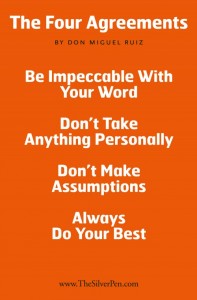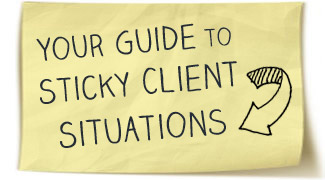
Imagine this: your babysitter just arrived, your coffee’s still hot, and you’re sitting down to start your work day. On the desk in front of you is a list of prospects. You’ve done your research; you know these businesses or individuals have the budget for your product, and you know they can use what you have to offer.
You can help them.
They need you.
But when you reach to actually pick up the phone and call the first person on your list, it feels like your phone weighs a million tons. A cold lump of fear forms in the pit of your stomach. Suddenly, your chair is digging into your back, you’re terribly thirsty, and you need to use the restroom.
You’d rather do anything instead of making those calls.
And since you’re your own boss, you don’t have to. So you put it off till the end of the day. Or tomorrow. Or next week. Maybe next month.
It’s not until your business has dried up and you’re scrambling for income that you finally get the guts to start marketing again. And so your freelancing gets stuck in a cycle of feast-or-famine that you can’t seem to break out of.
In reality, of course, regular, proactive marketing to new clients and customers is essential for the health of your business.
But for many people, it’s terrifying. It’s not that you don’t believe in yourself or your product. It’s not that you don’t want to grow.
It’s just that marketing is a numbers game, which is another way of saying that for every sale you make, there will be many, many rejections. And you’re experiencing the natural, human fear of rejection.
We’re hardwired to feel bad about rejection — and it doesn’t really matter whether it comes from a total stranger or a prospect you thought was a sure sale.
But if you want to grow your business, it’s time to change the way you think about rejection. Because in reality, rejection is good for your business.
One thing I look back at over and over again is “The Four Agreements” by Don Miguel Ruiz. Remind yourself of these when you feel rejected.
But what are some other ways to think about the rejection that is inevitably going to happen?
Learn these five truths about rejection, and you just may find that cold lump of fear will start to fade.
1. Rejection means you’re making the effort.
You can only control so much in terms of which of your marketing efforts will result in a sale. But getting rejected means you’re doing the part that you can control: you’re putting your product out there.
Many entrepreneurs set goals for growth: maybe you want to sell X number of products or sign up X number of new clients. But that’s an unrealistic goal, because you can’t control how many people will buy. All you can control is how many prospects you contact.
Rejection is a sign that you’re making progress toward your marketing goals. Think of it not as a lost sale, but as an essential task accomplished.
2. Rejection is a step toward success.
There’s an old saying that before a child can learn to ride a horse, he needs to fall off at least 100 times. Rejection isn’t failure — it’s just a step toward the next sale.
Every time you’re rejected, think of it as one of the necessary falls that will eventually make you an accomplished equestrian. Be like the writer Steven King, who nailed rejection slips to his wall as a reminder that every rejection brought him one step closer to getting published.
3. Rejection is a social interaction.
Freelancing is a lonely endeavor. You may love the fact that you can hole up in your office in your pajamas all day, but marketing gives you the chance to make contact with someone outside of your house (and someone who’s taller than three feet).
That’s not just good for your business — it’s good for you, too. Why do you think rejection hurts so much? It’s because we’re social creatures.
Think of marketing as a chance to make a connection with a real, live adult. Even if they say no, at least you had a conversation.
4. Rejection gives you the opportunity to experiment.
The freedom to be creative is half the fun of freelancing. Rather than thinking of rejection as a message about you and your services, think of it as a message about your marketing method — and use it as an opportunity to try a new method.
You can even split-test your marketing efforts. Play a game with yourself: cold call/email half your prospects and email the other half, and see which type of marketing is more effective for you.
5. Rejection can start a relationship.
You don’t have to be a pushy salesperson to recognize that “no” doesn’t always mean “never.” If a prospect responds to you at all, consider it an opportunity — not to force a sale, but to build a relationship. Maybe they don’t need your services right now, but can you connect them with another type of service that they do need?
Can you tell them about a resource that might be useful for them? Look for ways to be helpful to your prospects when they’re not ready to buy, and you’ll be the first person they think of when they are.
So what are you waiting for? Pick up that phone or computer and spend a few minutes marketing today.
Rejection won’t hurt you unless you let it. It’s how you respond to rejection that counts.
Photo credit






